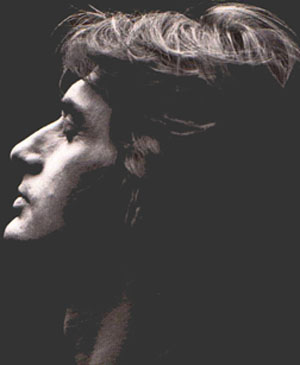FAMILIAR
Mike
Oldfield: wasn't the first Tubular Bells enough?
 In
1973 the 49 minute progressive-rock classic Tubular Bells not only seeded
the Virgin empire by selling 16 million copies but also set a benchmark
of acclaim which its then 20-year-old creator has yet to achieve again.
Now on a new record label, Mike Oldfield seeks to reverse the long-term
decline of his music's profile by attempting a project at once all too
obvious and, for that very reason, breathtakingly perilous.
In
1973 the 49 minute progressive-rock classic Tubular Bells not only seeded
the Virgin empire by selling 16 million copies but also set a benchmark
of acclaim which its then 20-year-old creator has yet to achieve again.
Now on a new record label, Mike Oldfield seeks to reverse the long-term
decline of his music's profile by attempting a project at once all too
obvious and, for that very reason, breathtakingly perilous.
His challenge is not only to match the quality of the original - and
listeners will be comparing every last crochet and quaver - but to beat
the charge of mere repetition by displaying some conspicuous new tricks.
For Oldfield, there's a lot on the line. To paraphrase the movie poster:
TBII - this time it's personal.
What
surprises is what a very tame first impression TBII makes. Like its
predecessor , Tubular Bells II consists of a string of motifs without
sustained thematic or dramatic development. Oldfield has clearly decided
to re-create the mood of TBI: elegiacally pastoral, yet animated by
contrasting currents of sunburst awe and Goonish jocularity -just one
pretty tune after another, with a little larking around by way of light
relief. Unlike the original record, however, the mood-setting opening
motif is not a particularly strong tune. Called The Sentinel, this pale
clone of the mysterious Tubular Bells theme is unlikely to soundtrack
a horror blockbuster (The Exorcist, remember?) or ingrain itself into
the fabric of '70s scholastic life as indelibly as that poster of the
tennis player scratching her bare bottom.
But where the original album faded in the second half, TBII spreads
its charms evenly. Updates of original themes (and these updates are
often no more than anagrams of original tunes slightly rearranged and
retextured) draw you into the record rather than make you yearn at times
to go back to the beginning. And amidst the familiar interplay of mostly
electrified folk, Celtic and hornpipe tunes with reflugent washes of
romantic harmony, there is the novelty of an offbeat vocal pop song,
Altered State, which in its punchline-free whimsy, has all the curious
charm but limited shelf-life of someone else's home video. As for the
great Viv Stanshall's original recitation of the various instruments
played (now including something called "the Venetian effect"
), TBII reprises this halfway point in the album with an uncredited
voice of familiar intonation both grand and slightly sinister: stand
up the Sheriff of Nottingham, one hazards a guess, Alan Rickman.
A more consistent but less tune-happy musical sequence than TBI, the
new album has one distinct advantage: whatever goes into producer Trevor
Horn's fairy dust, it makes your record player at home sound like a
million dollars. This time, audiophiles will not be able to beef about
a 100 hertz mains hum spoiling this pristine recording. That's progress
- just about the only "progress" you will find two decades
on from that original zenith of progressive rock. Even progress, it
seems, is something to get nostalgic about.
Mat
Snow
Q
Magazine 1992

